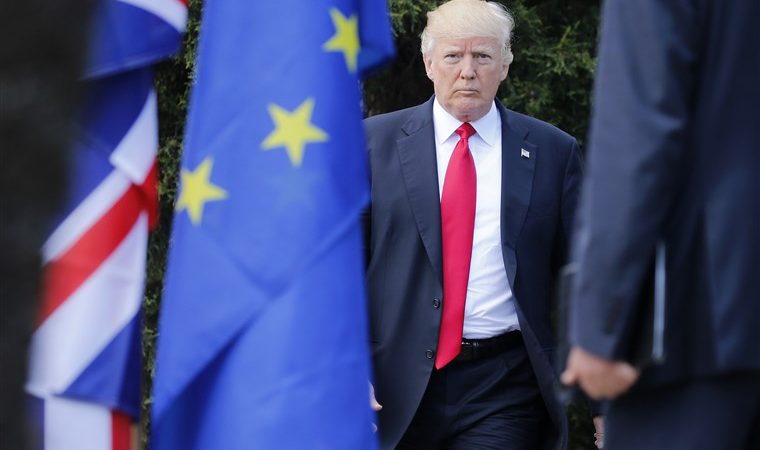It is crucial for the EU to advance in trade talks with the US

US President Donald Trump fights trade wars on many fronts. There are the trade disputes with China, which threaten global supply chains and did their bit in contributing to the emerging markets currency rout over the past few weeks.
He came to an agreement on the North American Free Trade Agreement (NAFTA) with Mexico. The Mexicans had to concede higher North American local content in the automotive sector (75 percent up from around 68 percent) and higher hourly wages ($16).
Canada is not there yet, but will probably get there. Dairy products are the stumbling block. Tariffs on steel and aluminum are important to Canada too. By far the biggest share of these imported metals in the US comes from Canada, which is why it hurt Canada’s economy when Trump imposed levies on these metals in the spring.
A resolution of this particular trade conflict not only benefits Canada and Mexico, it is also pivotal for the US. As many as six million US jobs can be attributed to NAFTA. Over the past 25 years the North American supply chains have become increasingly integrated, especially in the automotive sector, in which parts get shipped back and forth each time value is added.
Over the summer the rhetoric between the EU and the US heated up considerably. The US President was outraged by the EU trade deficit with the US of $151 billion in 2017. As The New York Times pointed out correctly, this deficit holds true for goods. However, if you add in services (e.g. finance, technology, legal) the European surplus shrinks to $101 million.
Nevertheless the US slapped a 25 percent tariff on steel and a 10 percent one on aluminum. In June the EU retaliated with tariffs on bourbon, motorcycles and orange juice — all neatly targeted to hit electoral districts, which are important to Republicans in the forthcoming mid-term elections.
We all remember Trump’s outrage when all-American motorbike brand Harley-Davidson announced it had to move part of its production to Europe to remain competitive. Trump retaliated, announcing that he was contemplating a 25 percent tariff on European cars. This would hit Europe where it really hurts. Germany’s economy is highly dependent on manufacturing and exporting cars. France’s automotive sector is not negligible, either. Germany is, furthermore, the engine behind economic growth in the Union.
In July, EU Commission President Jean-Claude Juncker went to see Trump at the White House. They seemed to have a breakthrough in the tit-for-tat dynamic, announcing that they could notionally live in a zero-tariff world. That sounded great for the chiefs to declare victory. Only trade negotiations are not that easy. They are tedious and detail-driven. Therefore the bucket was passed down one echelon.
This week EU trade Commissioner Cecilia Malmstrom is meeting US Trade Representative Robert Lighthizer. For the time being they are carving out cars. They are scheduled to discuss non-auto industrials, soybeans and liquefied natural gas (LNG).
The US side would like to include other agricultural products, which would be tricky for Malmstrom. The French are fiercely opposed to US agricultural imports. Most other European countries also have a different outlook to the US when it comes to hormone content of meat or genetically modified crops.
The discussion might become heated when it comes to LNG, too. The Nordstrom II pipeline, which will import gas from Russia, is a priority for Germany. At the same time it is a pet peeve of the US President.
All in all, it is crucial for the EU to advance in its trade talks. In the end the EU cannot thrive without the German economy, which in turn needs a buoyant automotive sector.
Even if this instalment of the talks goes well, the automotive talks will be fraught. Trump wants to see more US cars on Europe’s streets and fewer European vehicles on America’s. This may be difficult even in a no-tariff world, because nimbleness and quality of European vehicles comes into the equation.
Why should the rest of the world worry about the EU’s trade woes with the US? Trade is important to help economies thrive. GCC economies particularly are still quite dependent on the oil and gas sector. A localization of supply chains will result in less demand for oil, which is still the premier fuel of transport. Less trade means also less economic growth, which translates into fewer affluent consumers, who will embark on fewer trips by car or plane, which is another dampener on oil consumption.
Related News

Bidding for 75% PIA stake takes place on Tuesday
ISLAMABAD, DEC 22 – The government will hold open bidding for the privatisation of 75%Read More

UAE ambassador meets President Zardari to discuss deepening bilateral relations
ISLAMABAD, DEC 22 – Ambassador of the United Arab Emirates (UAE) to Pakistan Salem MohammedRead More


Comments are Closed